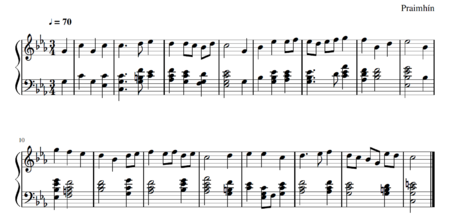Verse:Hmøøh/King Sămtsay Song: Difference between revisions
m (→Music) |
mNo edit summary |
||
| (19 intermediate revisions by 2 users not shown) | |||
| Line 1: | Line 1: | ||
The '''King Sămtsay Song''' ([[Windermere]]: ''Chnur Păchnay Sămtsay'' /xnuɐ pəxˈnaj səmˈtsaj/) is the national anthem used in the Windermere Commonwealth countries: the [[Verse:Tricin/USB|United States of Bjeheond]], [[Verse:Tricin/Tumhan|Tumhan]], [[Verse:Tricin/Pategia|Pategia]], and | The '''King Sămtsay Song''' ([[Windermere]]: ''Chnur Păchnay Sămtsay'' /xnuɐ pəxˈnaj səmˈtsaj/) is the national anthem used in the Windermere Commonwealth countries: the [[Verse:Tricin/USB|United States of Bjeheond]], [[Verse:Tricin/Tumhan|Tumhan]], [[Verse:Tricin/Pategia|Pategia]], [[Verse:Tricin/Yocneam|Yocneam]], and Quintlopetl. | ||
==Lyrics== | ==Lyrics== | ||
[Under construction!] | [Under construction!] | ||
Only the first | Only the first verse is used in modern usage. | ||
{{col-begin}} | {{col-begin}} | ||
| Line 10: | Line 10: | ||
<poem> | <poem> | ||
'''''Fi Chnur Păchnay Sămtsay''''' | '''''Fi Chnur Păchnay Sămtsay''''' | ||
''Răsüel bruang mi spey e Sămtsay ăchemloa;'' | ''Răsüel bruang mi spey e Sămtsay ăchemloa;'' | ||
''Ănngun ef | ''Ănngun ef hăltcäw te prien min noy smaw tsoa.'' | ||
''Răłow ya | ''Răłow ya șă'or e tsor hües te slăngay,'' | ||
''Ătsäs șa- | ''Ătsäs șa-tăngoa ef păchnay bang Sămtsay!'' | ||
</poem> | </poem> | ||
{{col-break}} | {{col-break}} | ||
<poem> | <poem> | ||
'''The King Sămtsay Song''' | '''The King Sămtsay Song''' | ||
May gracious Sămtsay endure long in health; | May gracious Sămtsay endure long in health; | ||
May the power and wisdom in him grow yet more by the morning. | May the power and wisdom in him grow yet more by the morning. | ||
May every street and | May every street and town square shout enthusiastically, | ||
"May our king forever remain Sămtsay!" | "May our king forever remain Sămtsay!" | ||
</poem> | </poem> | ||
| Line 28: | Line 26: | ||
==Music== | ==Music== | ||
{{col-begin}} | {{col-begin}} | ||
{{col-break}} | {{col-break}} | ||
{{col-break}} | {{col-break}} | ||
[[File:Pategian anthem.png|thumbnail|The tune used in [[Verse:Tricin/Pategia|Pategia]] ([https://linguifex.com/w/images/2/2e/Pategian_anthem.mp3 listen])|450px]] | [[File:Pategian anthem.png|thumbnail|The tune used in [[Verse:Tricin/Pategia|Pategia]] ([https://linguifex.com/w/images/2/2e/Pategian_anthem.mp3 listen])|450px]] | ||
{{col-end}} | {{col-end}} | ||
In Bjeheond, the anthem is usually accompanied by konnakol and is in a ''tălea'' known as ''Tălea Deașad'', same as the Carnatic ''desadi tala''. The tune was written by Talman-Bjeheondian experimental composer Prăfin of Balang. | |||
In Quintlopetl, the anthem is sung to a tune composed by Etsoj Jopah. | |||
Latest revision as of 19:01, 18 March 2024
The King Sămtsay Song (Windermere: Chnur Păchnay Sămtsay /xnuɐ pəxˈnaj səmˈtsaj/) is the national anthem used in the Windermere Commonwealth countries: the United States of Bjeheond, Tumhan, Pategia, Yocneam, and Quintlopetl.
Lyrics
[Under construction!]
Only the first verse is used in modern usage.
|
Fi Chnur Păchnay Sămtsay |
The King Sămtsay Song |
Music
In Bjeheond, the anthem is usually accompanied by konnakol and is in a tălea known as Tălea Deașad, same as the Carnatic desadi tala. The tune was written by Talman-Bjeheondian experimental composer Prăfin of Balang.
In Quintlopetl, the anthem is sung to a tune composed by Etsoj Jopah.
